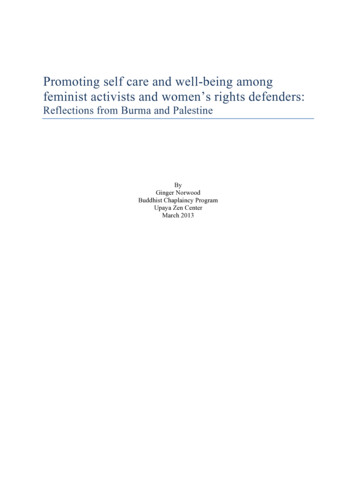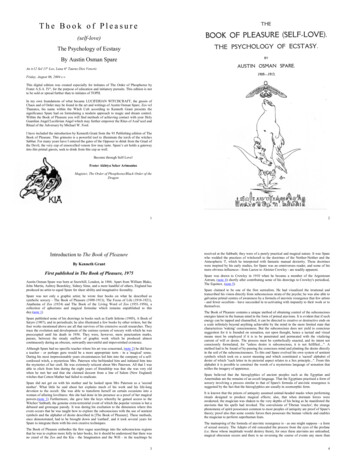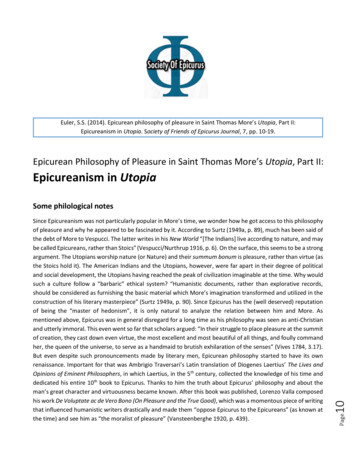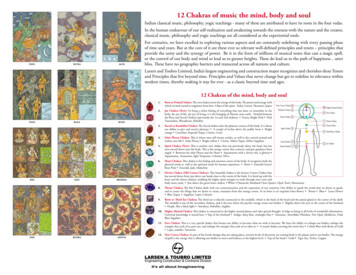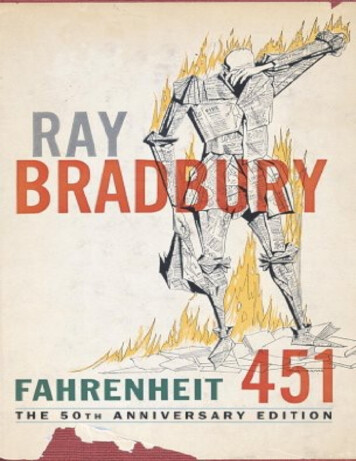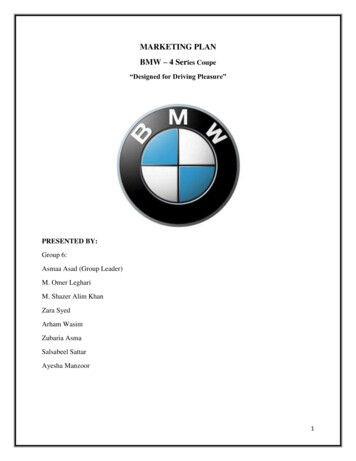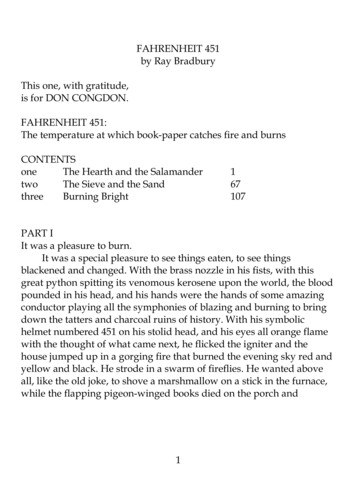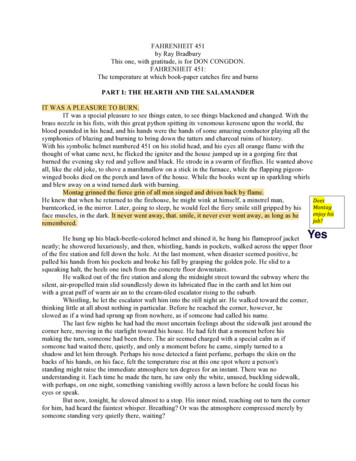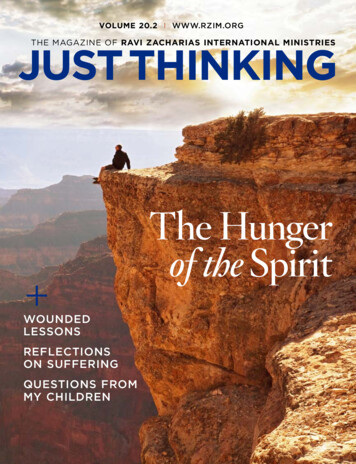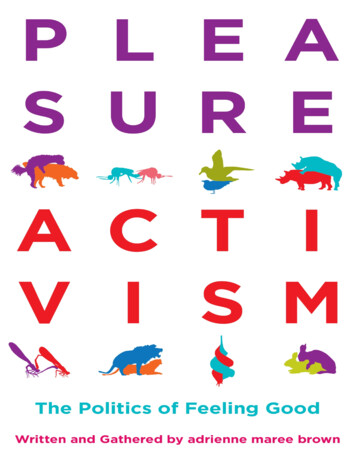
Transcription
PLEASURE ACTIVISMThe Politics of Feeling Goodwritten and gathered by adrienne maree brown
DEDICATIONI dedicate this book to Alana Devich Cyril (April 17, 1976–October 27, 2018), who I loved and learnedfrom during the journey of creation and pleasure research for this book (and include as a teacher in thesepages). She said, “Drink in beauty. Pleasure is a practice. Practice pleasure like your life depends on it.”I also dedicate this book to Prince for the awakening. He said “I only wanted one time to see youlaughing.”
INTRODUCTIONThe role of the artist is to make the revolution irresistible.—Toni Cade BambaraHello. Welcome to Pleasure Activism: The Politics of Feeling Good.1My name is adrienne maree brown. I am a facilitator, emergent strategist,doula, healer, auntie extraordinaire, and pleasure activist. I am your host in thissensual space, your learning companion on this pleasure journey, possibly evenan arrow pointing to your erotic awakening. I have gathered here everything Iknow so far about pleasure activism in the form of essays, interviews, profiles,poems, and tools.My intentions for readers of this book are that yourecognize that pleasure is a measure of freedom;notice what makes you feel good and what you are curious about;learn ways you can increase the amount of feeling-good time in yourlife, to have abundant pleasure;decrease any internal or projected shame or scarcity thinking around thepursuit of pleasure, quieting any voices of trauma that keep you fromyour full sacred sensual life;create more room for joy, wholeness, and aliveness (and less room foroppression, repression, self-denial and unnecessary suffering) in yourlife;identify strategies beyond denial or repression for navigating pleasure inrelationship to others; andbegin to understand the liberation possible when we collectively orientaround pleasure and longing.Bonus: realize you are a pleasure activist!Trust is a crucial part of the intimacy that yields pleasure for ourselves andothers. Most likely you don’t know me, so whatever trust can exist between uswill come from how well I can share and how much you can open yourself towhat I share. In that spirit, it feels important that you know a bit about my
identity, contradictions, practices, and desires as they relate to pleasure.I have a Black father and a white mother with a big love story, and I grew up inall of the possibility of that. My family has not escaped white supremacy, racism,internalized racism, or colorism, but we have experienced those patterns andsicknesses from a position of love that can see through them to the humansbeneath the socialization. Mostly.I identify as a Black mixed person in the particular racial construct of thiscountry at this time. I understand that race is a social construct, not a biologicalone—and in this life I experience a lot of pleasure in being Black. I love Blackgirl magic, Black joy, Black love, and work toward Black liberation. I feelunapologetic glee at the ways in which we subvert white supremacy, dominateculture, and “coolness,” often inviting people to the pleasures we haveconstructed from dreams and thin air.And I understand this to be temporary—that there were, among myancestors, feelings of love to be of tribes whose names I will never know or fromnations no longer on any maps. In the future, there may be a time when the term“Black” feels to my nibblings’ nibblings the way the terms “Negro” or“Quadroon” sound to me now;2 perhaps these future nibblings will invent newterminology indicating some way of understanding themselves that I cannotcomprehend. There may be a time beyond these borders, beyond these racialconstructs, beyond this planet even. I feel humble in the face of all that time.And, in this time, it’s a gift to be Black.Similarly, I am learning that much of how we experience and practice gender isa social construct—and I love the particular pleasures of being a woman. I lovebeing of women who transform the brutal conditions we survive, who areupending rape culture, knowing we are inferior to no one, weaving our sufferinginto a fierce togetherness, into homes, chosen families, radical sisterhood, andtomorrows.And I’m a woman with some boy in me and haven’t found the language forthat.I know it is a privilege to feel aligned with the gender assignment I was givenat birth. I love the bodies I was born from and with. And I love the wildlydiverse spectrum of bodies I have gotten to hold, kiss, doula, and love in mylifetime.I imagine there have been periods in my ancestry when gender was held verydifferently, maybe didn’t matter so much, or was less binary. And I imagine therewill be a future with a multitude of widely known and understood genders. In
this moment, I get to be part of the expansion of possible genders that can liveand love safely on this planet.This book will center the experiences of Black women pursuing and related topleasure, because these are the particular experiences with which I am both mostfamiliar and most in community. But I am also always human and take seriouslythe truth that I am connected to all humans. I do not subscribe to any politics ofreduction. I may see the humor in stereotypes, but I do not live my life or desiresthrough the lens or limitation of anyone else’s construction of power, identity, orsupremacy. This book includes a few voices that are not Black or womanidentified but that I trust in the human experience of finding pleasure beyondoppression.I have been a student of facilitation since my late teens, learning how to makeit easier for people to be with each other. Along this journey I have been asked tofacilitate people at a lot of different levels, each request teaching me more aboutwhat facilitation can do—coach, healer, doula, relationship supporter, griefsupporter and death doula, breakup guide, and confidante for sexual adventures,as well as an organizational, network, and coalition/alliance facilitator.3 I haveoften said yes, sometimes with trepidation, often with enthusiasm, because I amfascinated by how we interact with each other.This book comes about partially because I realized that I have supportedthousands of people in taking steps they crafted, articulated, and needed to take—steps closer to pleasure and liberation. I have seen, over and over, theconnection between tuning into what brings aliveness into our systems and beingable to access personal, relational and communal power.Conversely, I have seen how denying our full, complex selves—denying ouraliveness and our needs as living, sensual beings—increases the chance that wewill be at odds with ourselves, our loved ones, our coworkers, and our neighborson this planet.I enter this book with a lot of experience pursuing pleasure and power inhuman systems and a ton of hope and curiosity about what might be possible ifwe were all living our full pleasure potential. What would happen if we alignedwith a pleasure politic, especially as people who are surviving long-termoppressive conditions?In the writing and gathering process, whenever I came to one of my edges orlimitations, I reached out and gathered in a comrade who knows more than I do—about sex work, BDSM, burlesque, legalizing marijuana, pleasure during gendertransition, recovering pleasure after childhood sexual abuse, pleasure while
battling cancer, pleasure over age sixty, and parenting to generate pleasureoriented children. I think the tapestry of voices here shows how many people areorienting toward and around radical pleasure in this political moment and justhow many ways there are to do that.Some other things to know:If I were living purely from my mind, I might have become a nun. And I don’tmean a naughty nun with no panties under my habit—I really love routines andquiet. I can get a ton of pleasure from precision, rigor, and discipline (those whohave experienced me as a teacher may have an inkling of this). I like being ofservice. And I feel a thrumming, full aliveness when in conversation with thedivine. I think a lot about what god is, how god is, and where we are relating toand running from and surrendering to god. My answers are always shifting, butthat conversation has been continuous in my life.But! If I were living purely from my body, I might have achieved some worldrecord for sexual activity, or at least be the belle of some wild bordello. Perhapsa Black Moulin Rouge singer4—I love seduction, I love sex, I love an exposedshoulder, the curves of the hip, the moment of realizing that under the top layerof clothing there’s no bra or boxers containing the body I am observing. I lovethe unspeakable heat of romance. I love all the ways we are sensual. I like tosmell good, taste everything yummy, feel how alive skin is, listen to sounds ofbreath and pleasure, see the beauty of flesh and bones. Laugh uncontrollably.Play. Feel alive. My body has the capacity to sense immense pleasure, and as Iget older I keep intentionally expanding my sensual awareness and decolonizingit so that I can sense more pleasure than capitalism believes in.I am a hermit nudist at heart. It has taken me a while to learn this, but I feelmost at home when I am alone and naked. Or with someone where we can bealone/together, naked.I know that my body could never be inappropriate. If I walk around naked allthe time, or wear a muumuu slit to the moon to show my big dimpled thighs, orlet my tummy hang soft and low, it’s right. I am of nature. I have cycles in mybody that reflect the cycles of day and night, of the seasons, of the moon and thetides. My body is a gorgeous miracle. I know it is only conditioning and shame,particularly fat shame, that keeps me covered (especially when I am in placeswhere it’s too hot to wear a top and men are running around shirtless).For now, I wear clothes because I enjoy fashion and to get warm during colderparts of the year. But as I get older, it’s hard to keep clothing on at home, andwhat I do wear needs to flow and not make a big deal against my skin or it can’t
stay. I also feel this way about the company I keep—that I need people aroundme who can adapt, have a gentle bright presence, who make me feel free,creative and beautiful in every aspect.And even though I have this hermit nature, I get down with people and love it.If I am forced to choose labels to describe the ways I move toward people, I sayI am pansexual to express who I am attracted to and/or queer for how I relate tosex and the world. Pansexual means my desire is not limited by the biologicalsex, gender, or gender identity of a potential lover. I would add species, just incase new hot aliens arrive in my lifetime. So far, I have been most attracted togender-fluid beings, particularly masculine women, effeminate men, and transmen.And I am queer, in the grandest sense of the word. I buck the norms in mysexual life and in the rest of my life. For instance, while I enjoy a solid dose ofmasculinity in my lovers, it only intrigues me if I can top, bottom, and sidewaysthem, and if they can see the woman and the boy in me.I have tried on monogamy, open relationships, polyamory, and solitude.Nonmonogamy tends to suit me best, even if I am occasionally focused on onelover. A recent lover shared a framework with me called relationship anarchy,which is the most precise articulation I’ve come across so far of my approach tolove and sex, basing connection in trust, freedom, change, and honestcommunication.5So that’s the sex and relationship landscape now, onto the drugs!Before I share my drug history, I want to say that I believe that most drugsshould be legalized and that there should be safe spaces to use them. I have beenprivileged and fortunate to safely move through my explorations. Those who arecurrently incarcerated for getting medicine to people should be released andgiven opportunities to actually lead in their industry.I have been an active drug user since my sophomore year of college, when Ifirst smoked weed. I have smoked, vaped, salved, and eaten cannabis productssince that fateful day and really enjoy the moderation I have been slowlygrowing, as well as the cultural shift toward legalization that is sweeping theUnited States.I also love mushrooms! I think they are truly magical, and I have had somedelightful weird experiences of perceiving the world’s aliveness while trippingon mushrooms on multiple continents.6 In general, the role that fungi play innature is wonderful—they are communicators, they process toxins, they breakdown dead material and make it serve life. I think fungi are a crucial part of any
functional ecosystem, including our human ecosystems. But I also like toimagine mushrooms giving trees and squirrels hallucinations, for kicks.I went through a period in my twenties where I was doing ecstasy all the time,and I believe it saved my life, to be able to buy and swallow happiness when Icould not figure it out internally.7 My pleasure goddess self definitely began toburst the seams of my post-sexual-trauma-frumpy-girl disorder during thoseyears.I haven’t gone much further in the realm of drugs—a sniff or tab here, arecreational Vicodin or Percocet there. But I was once hospitalized with vampirebites,8 and they put me on an IV with Benadryl and Dilaudid. Within a day, I waslying about the amount of pain I was in so they would give me more ofwhichever one was making everything feel like a cloud. When I left the hospital,I understood that I could never play with injection drugs, not if I also wanted todo things with my life. I think of this as harm reduction (which you will learn alot about in this book), basically reducing or limiting the harmful impact of druguse on my life.I love sex and drugs. I have an addictive personality, a gift and learning edge Iinherited from my paternal grandmother, so I’ve learned to only engage thoseactivities in substances I can moderate. Except sugar—so far that one tends to beall or nothing.BeliefsThe other thing I want to share with y’all are a few foundational beliefs thatshape everything else that will flow from me.I believe that all organizing is science fiction—that we are shaping the futurewe long for and have not yet experienced. I believe that we are in an imaginationbattle, and almost everything about how we orient toward our bodies is shapedby fearful imaginations. Imaginations that fear Blackness, brownness, fatness,queerness, disability, difference. Our radical imagination is a tool fordecolonization, for reclaiming our right to shape our lived reality. Octavia’sBrood: Science Fiction from Social Justice Movements explores these ideas indepth.9I believe that we are part of a natural world that is constantly changing, and weneed to learn to adapt together and stay in relationship if we hope to survive as aspecies. Emergent Strategy: Shaping Change, Changing Worlds explores theseconcepts in depth.10I believe in transformative justice—that rather than punishing people for
surface-level behavior, or restoring conditions to where they were before theharm happened, we need to find the roots of the harm, together, and make theharm impossible in the future. I believe that the roots of most harm are systemic,and we must be willing to disrupt vicious systems that have been normalized. Ibelieve that we are at the beginning of learning how to really practicetransformative justice in this iteration of species and society. There is ancientpractice, and there will need to be future practices we can’t yet foresee. But Ibelieve that with time it must become an incredible pleasure to be able to behonest, expect to be whole, and to know that we are in a community that willhold us accountable and change with us.I am in this practice in as many spaces as I can be in my life. I believe thattransformative justice is actually a crucial element in moving toward the kind oflarge-scale societal healing we need—transformative justice is a way we canbegin to believe that the harm that has come to us won’t keep happening, that wecan uproot it, and that we can seed some new ways of being with each other.I also believe that I am not creating the ideas in this book but observing abeautiful pattern of pleasure shifting the ground beneath us, inside us, andtransforming what is possible between us. I have learned from so many teachersliving and dead. To that end, I have an extended section of this book that islineage, tracing the streams that are flowing into this particular river in ways thatI hope create common ground, even a common titillation, between you and me.Finally, I am constantly discovering new parts of myself to bring into the light,and that feels like an essential aspect of pleasure activism. I am discoveringthings as I write this book, and I will keep discovering things afterward.As I gather this book together I am sitting in a quiet house, off season, onMartha’s Vineyard. Right now, I am watching two massive swans slowly extendtheir long necks, bobbing in icy water, reaching toward each other, equal partstentative and persistent. It is that energy in me as I take the tentative steps intothis realm of the erotic, of the sensual, and ask us to explore together all of thepower we potentially wield together.In these pages, I am intentionally bringing academics into conversation withexperiential experts, to show the patterns of aligned interest and learninghappening across the language barriers that exist between us. I am bringingtogether a lot of different styles of expression in order to weave this tale. I askedcontributors to share themselves as whole people, in the spirit of the CombaheeRiver Collective, who taught me that “from the personal, the striving towardwholeness individually and within the community, comes the political, the
struggle against those forces that render individuals and communities unwhole.The personal is political, especially for Black women.”11 Each person in this textis whole, complex, and brave in how they are shaping the world around them.We are in a time of fertile ground for learning how we align our pleasures withour values, decolonizing our bodies and longings, and getting into a practice ofsaying an orgasmic yes together, deriving our collective power from our feltsense of pleasure.I think a result of sourcing power in our longing and pleasure is abundantjustice—that we can stop competing with each other, demanding scarce justicefrom our oppressors. That we can instead generate power from the overlappingspace of desire and aliveness, tapping into an abundance that has enoughattention, liberation, and justice for all of us to have plenty.We’re going to keep learning together. These pages are a space to askshameless questions, to love what we love and explore why we love it, toincrease the pleasure we feel when we are doing things that are good for thespecies and the planet, to cultivate our interest in radical love and pleasure, andto nourish the orgasmic yes in each of us.What Is Pleasure Activism?Pleasure is a feeling of happy satisfaction and enjoyment. Activism consists ofefforts to promote, impede, or direct social, political, economic, orenvironmental reform or stasis with the desire to make improvements in society.Pleasure activism is the work we do to reclaim our whole, happy, and satisfiableselves from the impacts, delusions, and limitations of oppression and/orsupremacy.Pleasure activism asserts that we all need and deserve pleasure and that oursocial structures must reflect this. In this moment, we must prioritize thepleasure of those most impacted by oppression.Pleasure activists seek to understand and learn from the politics and powerdynamics inside of everything that makes us feel good. This includes sex and theerotic, drugs, fashion, humor, passion work, connection, reading, cooking and/oreating, music and other arts, and so much more.Pleasure activists believe that by tapping into the potential goodness in each ofus we can generate justice and liberation, growing a healing abundance wherewe have been socialized to believe only scarcity exists.Pleasure activism acts from an analysis that pleasure is a natural, safe, andliberated part of life—and that we can offer each other tools and education to
make sure sex, desire, drugs, connection, and other pleasures aren’t lifethreatening or harming but life-enriching.Pleasure activism includes work and life lived in the realms of satisfaction, joy,and erotic aliveness that bring about social and political change.Ultimately, pleasure activism is us learning to make justice and liberation themost pleasurable experiences we can have on this planet.Pleasure PrinciplesWhat you pay attention to grows. This will be familiar to those whohave read Emergent Strategy. Actually, all the emergent strategyprinciples also apply here! (Insert eggplant emoji). Tune into happiness,what satisfies you, what brings you joy.We become what we practice. I learned this through studying somatics!In his book The Leadership Dojo, Richard Strozzi-Heckler shares that“300 repetitions produce body memory [and] 3,000 repetitionscreates embodiment.”12Yes is the way. When it was time to move to Detroit, when it was time toleave my last job, when it was time to pick up a meditation practice,time to swim, time to eat healthier, I knew because it gave me pleasurewhen I made and lived into the decision. Now I am letting that guide mychoices for how I organize and for what I am aiming toward with mywork—pleasure in the processes of my existence and states of my being.Yes is a future. When I feel pleasure, I know I am on the right track.Puerto Rican pleasure elder Idelisse Malave shared with me that herpleasure principle is “If it pleases me, I will.”When I am happy, it is good for the world.13The deepest pleasure comes from riding the line between commitmentand detachment.14 Commit yourself fully to the process, the journey, tobringing the best you can bring. Detach yourself from ego andoutcomes.Make justice and liberation feel good.Your no makes the way for your yes. Boundaries create the containerwithin which your yes is authentic. Being able to say no makes yes achoice.Moderation is key.15 The idea is not to be in a heady state of ecstasy atall times, but rather to learn how to sense when something is good for
you, to be able to feel what enough is. Related: pleasure is not money.Pleasure is not even related to money, at least not in a positive way.Having resources to buy unlimited amounts of pleasure leads to excess,and excess totally destroys the spiritual experience of pleasure.A Word on ExcessPleasure activism is not about generating or indulging in excess. I want to saythis early and often, to myself and to you. Sometimes when I bring up this workto people, I can see a bacchanalia unfold in their eyes, and it makes me feeltender. I think because most of us are so repressed, our fantasies go to extremesto counterbalance all that contained longing. Pleasure activism is about learningwhat it means to be satisfiable, to generate, from within and from between us, anabundance from which we can all have enough.16Part of the reason so few of us have a healthy relationship with pleasure isbecause a small minority of our species hoards the excess of resources, creatinga false scarcity and then trying to sell us joy, sell us back to ourselves. Somethink it belongs to them, that it is their inheritance. Some think it a sign of theirworth, their superiority. On a broad level, white people and men have been theprimary recipients of this delusion, the belief that they deserve to have excess,while the majority of others don’t have enough or further, that the majority ofthe world exists in some way to please them.And so many of us have been trained into the delusion that we mustaccumulate excess, even at the cost of vast inequality, in order to view our livesas complete or successful.A central aspect of pleasure activism is tapping into the natural abundance thatexists within and between us, and between our species and this planet. Pleasureis not one of the spoils of capitalism. It is what our bodies, our human systems,are structured for; it is the aliveness and awakening, the gratitude and humility,the joy and celebration of being miraculous.So rather than encouraging moderation over and over, I want to ask you torelinquish your own longing for excess and to stay mindful of your relationshipto enough. How much sex would be enough? How high would be high enough?How much love would feel like enough? Can you imagine being healed enough?Happy enough? Connected enough? Having enough space in your life to actuallylive it? Can you imagine being free enough?Do you understand that you, as you are, who you are, is enough?
GlossaryWhy a glossary? Language changes so quickly these days. The right way tospeak about people, about identities, about gender, about geography—everythingis in motion on a regular basis. I know that in writing this book I am creatingsomething instantly dated. Given that god is change, there are some terms in thisbook that I want to be super clear about.Bitch is one of my favorite words. When I say it, I mean you are fierce, I loveyou, wow, that’s the boss, be yourself, yes yes yes.Fat is a word I am reclaiming for myself, especially when connected to sexy,#sexyfat. I am thick, I am big, but most of what gives me this outstanding shapeand feel is actual fat.Somatics isa path, a methodology, a change theory, by which we can embodytransformation, individually and collectively. Embodied transformationis foundational change that shows in our actions, ways of being, relating,and perceiving. It is transformation that sustains over time. Somaticspragmatically supports our values and actions becoming aligned. It helpsus to develop depth and the capacity to feel ourselves, each other and lifearound us. Somatics builds in us the ability to act from strategy andempathy, and teaches us to be able to assess conditions and ‘what is’clearly. Somatics is a practice-able theory of change that can move ustoward individual, community and collective liberation. Somatics worksthrough the body, engaging us in our thinking, emotions, commitments,vision and action.17I teach and reference somatics often in these pages.Pleasure is “a feeling of happy satisfaction or enjoyment” and “to give sexualenjoyment or satisfaction to another.”Erotic is “relating to or tending to arouse sexual desire or excitement.”Finally, I believe we are actively moving toward a nonbinary gender future—onein which gender is understood as a spectrum instead of a binary with two optionsto move between. I write as someone raised in, interacting with, and
intentionally disrupting the gender binary. I respect how people identifythemselves, what they know themselves to be.When I use women in this text I mean any and all people who identify aswomen. This includes those who identify as cis, non-trans, trans, and anyoneelse who identifies with the words “woman” and “women.” The same is true formen—I include any and all who identify with the language of “man” and “men.”Nonbinary and gender nonconforming in this text refers to people who don’tidentify with women/men binary terminology. If the content requires adistinction that draws on a specific trans experience—which includes theexperiences of those who identify as transsexual or transgender, with or withoutsurgery—then I (or the writer of that piece) will make that distinction. In thistext, the pronouns will reflect the identity of the subjects being discussed—he,she, they, et cetera. If this is being read in a future in which this language hasevolved, then please know I would be evolving right along with you.1 If you can, I suggest that you have an orgasm before diving into this book and at the beginning of eachnew section. I am not joking—an orgasm a day keeps the doctor away and the worries at bay.2 “Nibblings” is a gender-neutral word for referring to the children of your sibling, introduced to me byTanuja Jagernauth.3 People also ask me for directions a lot, even when I am in a new place and feel lost.4 You might be thinking that movies aren’t real life. I am thinking that the line between the real and theimagined is a construct.5 See the essays “Love as Political Resistance” (p. 59) and “On Nonmonogamy” (p. 409) in this book formore on relationship anarchy.6 I recommend putting them in a fruity smoothie or dark chocolate.7 See the essay “Ecstasy Saved My Life” in this book (p. 263).8 I feel your doubt. It was three sets of paired bite marks on my left arm and two sets on the right. Thehospital didn’t believe me and said it was from dangerous urban composting. Like vampires don’t likeleaves.9 Walidah Imarisha and adrienne maree brown, eds., Octavia’s Brood: Science Fiction from Social JusticeMovements (Oakland, CA: AK Press, 2015).10 adrienne maree brown, Emergent Strategy: Shaping Change, Changing Worlds (Chico, CA: AK Press,2017).11 Combahee River Collective, “The Combahee River Collective Statement,” in Home Girls: A BlackFeminist Anthology, edited by Barbara Smith (New York: Kitchen Table: Women of Color Press, 1983),264–74.12 Richard Strozzi-Heckler, The Leadership Dojo: Build Your Foundation as an Exemplary Leader(Berkeley, CA: Frog Books, 2007), 59.13 I owe this one to my incomparable, brave, and brilliant Canadian woe, Jodie. Folks who are rooted insensing and seeking pleasure, and bring that energy into their work and relationships, are shining a lightfor others—there is another path that isn’t full of stress, self-doubt, pain, victimization, and suffering.There is a path in which everything is learning, playing, practicing, doing things anew.14 This is true in sex; it’s true in work; it’s just true.15 But as Maya Angelou once told Oprah, even moderation needs moderation.
16 My first memory of this concept, of being satisfiable, was from Staci Haines.17 “What is Somatics?,” Generative Somatics, accessed July 23, 2018,http://www.gen
Practice pleasure like your life depends on it.” . will come from how well I can share and how much you can open yourself to what I share. In that spirit, it feels important that you know a bit about my . , and desires as they relate to pleasure. I have a Black father and a white mother with a big
